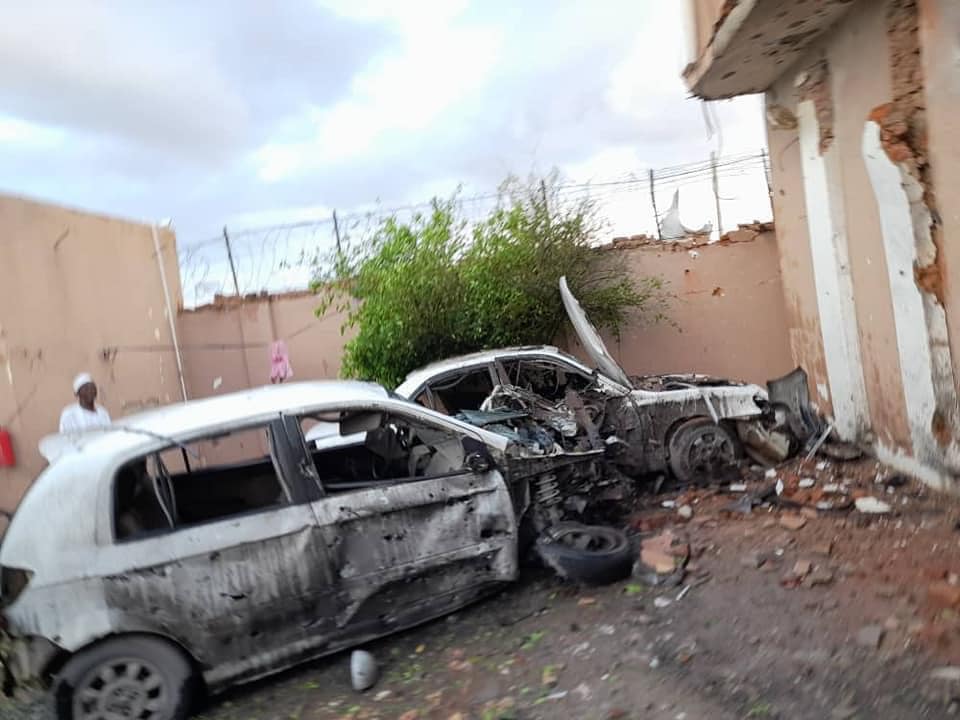Sudan army bombs its own soldiers in North Darfur, US officials repeat calls for a ceasefire

El Fasher, 18 August 2024 (File photo El Fasher Resistance Committees via Facebook)
Six army soldiers were killed and others were injured by ‘friendly fire’ during a airstrike on the garrison of the Sixth Infantry Division in El Fasher, capital of North Darfur, yesterday. Prominent US officials condemned the escalation of the fighting in and around El Fasher. According to Malik Agar, vice president of the Sovereignty Council, the war in Sudan will end in December.
A military source told Radio Dabanga that warplanes of the Sudanese Air Force mistakenly bombarded the site of the Maintenance Corps under the command of the Sixth Infantry Division, which led to the death of six soldiers and the injury of others who were taken to the El Fasher Military Hospital.
For months, fierce fighting between the Sudanese Armed Forces (SAF), supported by the Darfur Joint Force made up of rebel groups, and the paramilitary Rapid Support Forces (RSF) is paralysing life in El Fasher, the last of the five Darfur capitals that is not under RSF control.
The ongoing battles have led to the killing of hundreds of civilians and the flight of thousands to safer areas in Darfur or beyond.
On June 13, the UN Security Council adopted a resolution, demanding that the RSF cease its blockade on the North Darfur capital. UNSC members renewed their calls for an immediate cessation of hostilities, de-escalation, and the withdrawal of all belligerents threatening civilian safety in El Fasher.
Calls for a ceasefire
US Ambassador to the United Nations Linda Thomas-Greenfield said on her X account yesterday that she is “gravely concerned about reports of a serious escalation in RSF’s months-long siege on El Fasher. I urge RSF to halt its attack, including bombardments destroying infrastructure and threatening civilian life, and fulfil its commitments to the international community to protect civilians.”
Sean Savett, White House National Security Council spokesperson tweeted this morning that “We call on the RSF to immediately stop attacks on El Fasher, Sudan. In recent days the RSF’s months-long siege of the city has escalated, threatening the lives of hundreds of thousands of Sudanese already facing famine and displacement.”
Tom Perriello, US Special Envoy to Sudan, urged the RSF to stop its attacks on El Fasher. “The repeated attacks on El Fasher and the shelling of Abu Shouk and Al Salaam displacement camps nearby have already brought great suffering to Sudanese civilians, many of whom had fled to El Fasher in the face of other fighting in Darfur. [..] The RSF must take all steps to protect the lives of innocents and respect its civilian protection commitments,” he wrote in a post on X yesterday.
In a separate post, Perriello said that the members of the Aligned for Advancing Lifesaving and Peace in Sudan (ALPS) group, (USA, UAE, Saudi Arabia, Egypt, Switzerland, AU and UN, formed in Geneva last month) continue to push for more humanitarian and civilian protection measures in Sudan.
“So grateful to the humanitarian organizations and donors mobilizing hundreds of thousands of tons of aid for people in Sudan – food, medicine, and supplies to help the most vulnerable,” he stated. “The ALPS group strongly urges the SAF and RSF to do more – and do it faster! – to expand access on roads and streamlined movement of food by the UN and NGOs. We also call for immediate humanitarian pauses to allow aid to the most isolated areas.”
The ALPS group called on the SAF and RSF for an “immediate pause of the fighting” in El Fasher and the rest of Darfur. “We call for humanitarian pauses in Sennar, Khartoum, and El Gezira that would allow aid to flow through and to these areas as well,” in a joint statement yesterday.
“Inspired by the demands of the Sudanese people, the ALPS Group continues to pursue an urgently-needed cessation of hostilities for all of Sudan.”
‘Irresponsible’
Last week, Malik Agar, vice president of the Sovereignty Council, told ambassadors in Port Sudan, capital of Red Sea state and the administrative capital of Sudan since April last year, that the SAF-RSF war will end in December.
He called on the international community to help to rebuild what has been destroyed by the war.
It is not the first time an official of the Port Sudan de facto government has set a datefor the end of the war, and his statement sparked widespread reactions among the Sudanese.
“The situation on the military and negotiating fronts does not indicate any breakthrough that will lead to the end of the war within the next three months,” Noureddine Babiker, spokesperson for the Sudanese Congress Party.
“Such statements, made by members of the military establishment and officials in the war camp, are irresponsible.”
Political science expert Mahdi Dahab commented to Radio Dabanga that the warring parties, “whether the RSF or the Sudanese government, do not have the power to decide to stop the fighting, as there are parties managing the war scene. The army is managed by the Islamic movement, which has great influence on the course of the battles. [..] No one can set a specific date for the end of the war.”











 and then
and then